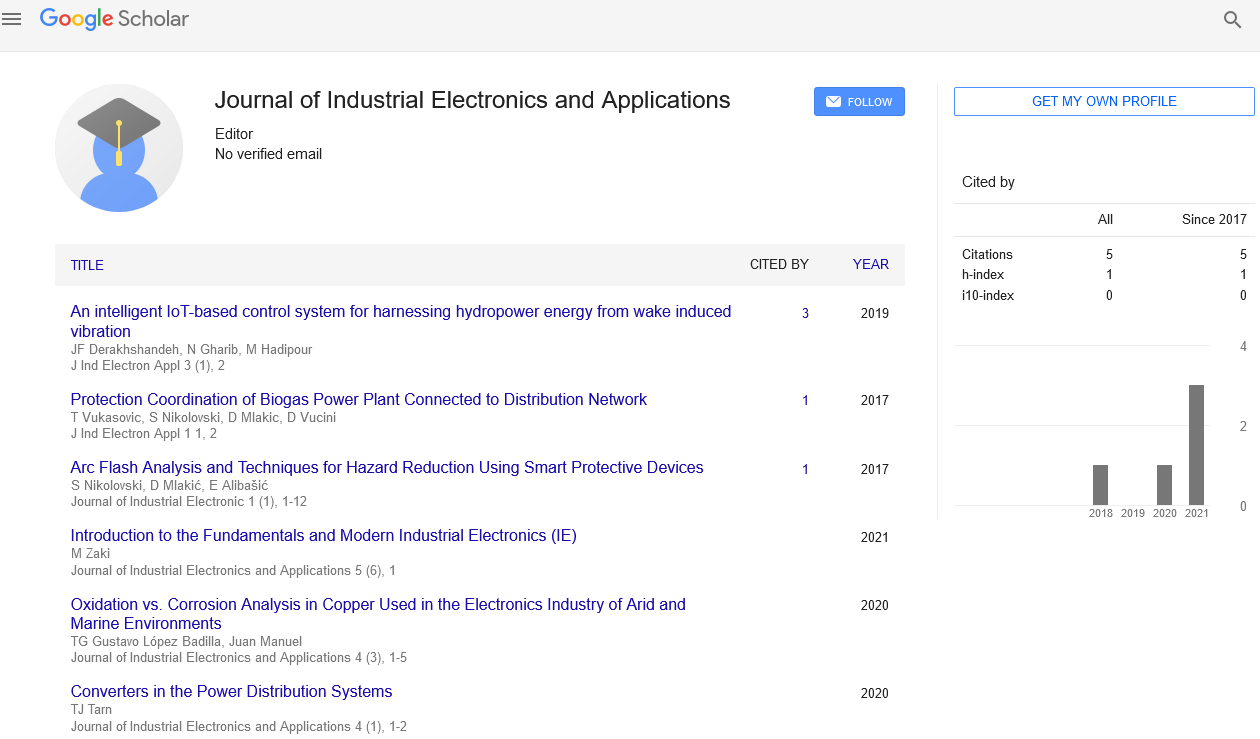Opinion Article, J Ind Electron Appl Vol: 7 Issue: 1
Industrial Electronics: Its Importance in the Manufacturing Industries
Wenn Lee Shi*
1Department of Electrical and Computer Engineering, National University of Singapore, Singapore, Singapore
*Corresponding Author: Wenn Lee Shi
Department of Electrical and Computer
Engineering, National University of Singapore, Singapore
E-mail: shilee2323@gmail.com
Received date: 24 February, 2023, Manuscript No. JIEA-23-93572;
Editor assigned date: 28 February, 2023, PreQC No. JIEA-23-93572(PQ);
Reviewed date: 13 March, 2023, QCNo JIEA-23-93572;
Revised date: 21 March, 2023, Manuscript No. JIEA-23-93572 (R);
Published date: 30 March, 2023, DOI: 10.4172/JIEA.1000016.
Citation: Shi WL (2023) Industrial Electronics: Its Importance in the Manufacturing Industries. J Ind Electron Appl 7:1.
Description
Industrial electronics is a field of electronics that deals with the application of electronic principles, devices, and systems in industrial environments. It is important aspect of modern manufacturing, enabling automation, control, monitoring, and communication in industrial processes. This study provides an overview of industrial electronics, its applications, and its importance in the manufacturing industry. It also explores the latest trends in industrial electronics, such as the Industrial Internet of Things (IIoT) and Industry 4.0.
Industrial electronics has been an essential aspect of the manufacturing industry for decades. It involves the application of electronic devices and systems in industrial processes to improve efficiency, reduce costs, and enhance productivity. Industrial electronics has revolutionized the manufacturing industry by introducing automation, control, and monitoring systems that have transformed the way industrial processes are performed. This study provides an in-depth look at industrial electronics and its role in modern manufacturing.
Applications of industrial electronics
The applications of industrial electronics are diverse and wideranging. They include:
Automation: Industrial electronics enables the automation of manufacturing processes, reducing the need for manual labor, improving accuracy, and reducing costs. Automation systems can include robotics, conveyors, and other automated equipment.
Control systems: Industrial electronics enables the implementation of control systems that regulate industrial processes, ensuring they operate within specified parameters. Control systems can include sensors, actuators, and Programmable Logic Controllers (PLCs).
Monitoring systems: Industrial electronics enables the implementation of monitoring systems that track industrial processes' performance, detecting faults and issues before they become major problems. Monitoring systems can include sensors, data loggers, and telemetry systems.
Communication systems: Industrial electronics enables the implementation of communication systems that enable remote monitoring and control of industrial processes. Communication systems can include Ethernet, Wi-Fi, and cellular networks.
Importance of industrial electronics in modern manufacturing
Industrial electronics is essential in modern manufacturing for several reasons. Firstly, it enables automation, reducing the need for manual labor and improving productivity. Automation systems can operate 24/7, ensuring that production is continuous, reducing downtime and improving efficiency.
Secondly, industrial electronics enables the implementation of control systems that regulate industrial processes, ensuring they operate within specified parameters. This improves product quality, reduces waste, and improves efficiency.
Thirdly, industrial electronics enables the implementation of monitoring systems that track industrial processes' performance, detecting faults and issues before they become major problems. This reduces downtime and maintenance costs, improving overall efficiency.
Finally, industrial electronics enables the implementation of communication systems that enable remote monitoring and control of industrial processes. This enables manufacturers to monitor and control their processes from anywhere in the world, improving efficiency and reducing costs.
Trends in industrial electronics
The Industrial Internet of Things (IIoT) is a trend in industrial electronics that involves the integration of physical devices with the internet and cloud computing. The IIoT enables the collection of realtime data from industrial processes, enabling manufacturers to monitor and optimize their processes in real-time.
Industry 4.0 is another trend in industrial electronics that involves the integration of Cyber-Physical Systems (CPS) with the internet and cloud computing. Industry 4.0 enables the creation of smart factories, where machines, devices, and systems communicate with each other and with humans, improving efficiency and reducing costs.
Conclusion
Industrial electronics is an essential aspect of modern manufacturing, enabling automation, control, monitoring, and communication in industrial processes. It has revolutionized the manufacturing industry, transforming the way industrial processes are performed. The latest trends in industrial electronics, such as the IIoT and Industry 4.0, are further improving efficiency and reducing costs, making the manufacturing industry more competitive and sustainable.
 Spanish
Spanish  Chinese
Chinese  Russian
Russian  German
German  French
French  Japanese
Japanese  Portuguese
Portuguese  Hindi
Hindi 